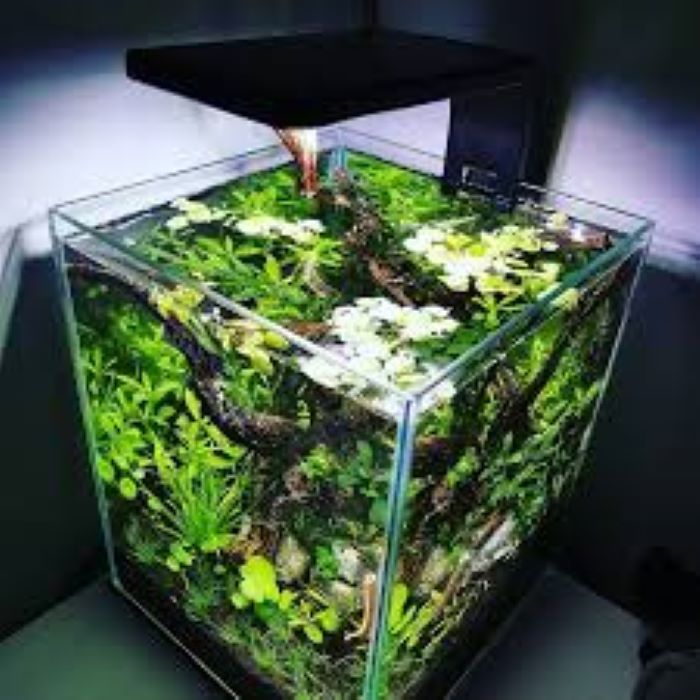For the proper lightening factor of the aquarium, one must be sure and clear about when should aquarium light be on? For this, 8-10 hours of light exposure is enough.
While dealing with fish aquariums, you must be clear about all the related maintenance perspectives for reliable working assurances. In terms of maintenance, lighting aspects are very crucial to go with. You have to be clear about all the light-related activities.
 Aquarium Lights
Aquarium Lights
FishClans.com
In this stance, one most frequently asked query stands by, when should aquarium light be on? Because aquariums are not reliably exposed to light 24/7 for a precise overview, it is better to keep the light on around the aquarium for around 10 to 12 hours.
Different aquariums have different lighting requirements. This requirement might vary as per the fish species. To provide you with a detailed overview of when should aquarium light be on. Here we are going to elaborate on some most general facts.
Let’s explore the details in the section below.
Table of Contents
Light Exposures for Fish Aquarium
The activity for the light exposure for the aquarium should be very concise. You have to keep a deep check on this activity. Most commonly, the fishes could be more precise in terms of light exposure. However, lighting becomes essential to maintain the natural life cycle for the fish and the plants inside it.
Thus, you must appropriately expose it to the light, mainly in the daytime, for around 8 to 10 hours.
You should turn on the light for day hours for a more concise and natural flow because fishes are bound to rest at night in complete darkness.
In an exceptional situation, there might be a situation when you need to put the light lamps on at night hours. Sometimes you are having snails and other related species in your fish aquarium. These snails used to eat at night.
To meet their feeding needs, you need to turn the lamp on so they can effectively look for their food. Light is very much crucial in terms of maintaining the natural surroundings of the fish.
Time Consideration
Light is essential for the fish tank for several reasons; thus, you must be concise in fulfilling all these reasons.
As it has been stated above twice, for an average consideration, you must keep the light factors on for around 8 to 10 hours. However, the condition becomes a bit different if you have saltwater in your aquarium.
They require a long span of lightning. Thus, you have to expand this time from around 9 to 12 hours to meet the nutrient needs of the fish. On the other hand, if you are still trying to figure out your aquarium light needs, you need to clarify what type of fish tank you are using so that you can predict the light factors appropriately.
During the first 6 to 8 hours of light exposure, you must maintain the intensity to an extreme level. After these 6 to 8 hours of powerful light intensity, you might lower the intensity level to create an exposure balance.
It is not that tough to handle, and you must be aware of the needs and requirements of your aquarium or the fish species. Once clear about these essential aspects, it will be easy to manage the lightning factor in real terms.
On average, the need for lightning for around 8 to 10 hours is significant for certain activities. These activities include,
- To support the life of the aquatic plant inside the aquarium.
- To fulfill the visualization activity of the fishes
- For feeding needs of the fishes
- Help the people to make aquarium aesthetics for global acknowledgment.
In this stance, there are available versatile lighting options. Above all, the sunlight factor is significant and tends to provide more advantages than any other resource. However, when other lighting resources are required for the night hours, you must choose the moonlight lamp choices in exceptional cases.
Because they are meant for the design and requirements of the natural flow, that is more likely to be appreciated by the experts as well.
The Final Statement
Managing the light factors of the aquarium is relatively easy, as it does not need light most of the time. However, you still have to be very careful in dealing with this perspective to avoid all the unrelated factors in maintenance.
link to Does Aquarium Fish Sleep?/ A Comprehensive Guide! link to Can 2 betta fish live together ? All you need to know about betta fish

Lena Whitmore is the lead writer at FishClans.com, bringing over 10 years of fishkeeping expertise and a master’s degree in Marine Biology to the site. Her extensive knowledge and practical tips have established her as a respected authority in the aquarist community. Lena’s work has appeared in leading publications and she frequently speaks at industry events.
Connect with Lena and FishClans on Facebook, Pinterest, and Instagram.

